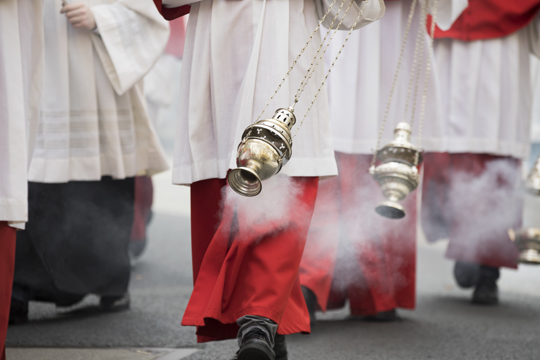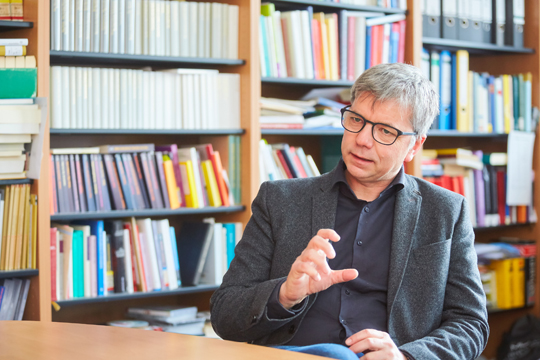Back to reality
Freiburg, Apr 02, 2019
Abolition of mandatory celibacy, women as priests, more co-determination of non-clerics: the theologian Prof. Dr. Magnus Striet has made some clear demands - even if they have met with resistance. The Catholic Church is in crisis, its membership is falling, as is the number of applicants for the priesthood. In addition there is the abuse scandal, which has shaken the church to its core. How can and should the church look in a modern society? Striet, Professor of Fundamental Theology and Philosophical Anthropology in Freiburg since 2004, is addressing these issues. Thomas Goebel recently sat down for a chat with him.

Living religiousness strengthens identity - those who are insecure shy away from debates that attack their own view of the world, says Magnus Striet. Photo: bilderstoeckchen/stock.adobe.com
Mr. Striet, as a professor for Catholic theology, why are you demanding the end of mandatory celibacy?
Magnus Striet: For me, there is no convincing substantive justification for mandatory celibacy - and in view of the numbers of young priests, one has to say that the system no longer works because fewer and fewer men are prepared to take office under these conditions. The churches still have an enormously important function in our fragmented society, and therefore it would be regrettable if the Catholic Church continued to weaken itself due to mandatory celibacy.
You have said that dealing with sexuality is only one example of the church's lack of "self-enlightenment" in dealing with social changes. What do you mean by that?
In the past few decades the Catholic Church has missed the opportunity to openly face the fact of new ways of life from a management perspective. In general it has an enormous lack of self-enlightenment with regard to questions of human science and sexology. The most urgent example is homosexuality: In the Church it is still said that in biblical times a partnership between people with homosexual orientation was forbidden. But this does not even correspond to the historical facts. Among other things the rape of men in war situations was forbidden. This has nothing to do with the concept of homosexuality, which is socially recognized in our society today.
Where does this difficulty originate in getting involved with topics such as homosexuality?
The teaching authority of the Catholic Church - that is, the teaching authority exercised by the Pope and the bishops - is hardly in a position to correct itself. The more positions have been historically created, the more difficult it becomes. It is always difficult to correct oneself. If one represents such a definition of the office as that in the Catholic Church, it does not become easier.
So is it ultimately a question of structure and thus of power?
Yes, I would recommend rationally posing the system question in the Church instead of always using theologically highly charged terms. It is about the distribution of power. If it does not develop a flatter organization, meaning with clearly organized participation rights of non-clerics, then the Catholic Church will not find its way out of its crisis.
In your opinion, which fundamental system changes would make sense?
What is important are legally secured forms of participation at the global and local church level. If decisions are always made from top to bottom, there are hardly any possibilities to act creatively and flexibly. And the most urgent task is to finally face the question of women's rights. The question of admission to office must not be ignored.

“They wanted to protect the office and were not willing to identify priests as perpetrators.”Magnus Striet is developing educational recommendations as a member of the commission“Power and Abuse”. Photo: Harald Neumann
You are a member of the Freiburg diocesan commission “Power and Abuse.”What needs to happen now to deal with the abuse scandal?
All previous studies show that the abuse and its cover-up have systemic reasons: They wanted to protect the ministry and were not prepared to identify priests as perpetrators. In the Commission itself, we will deal with the abuse scandal in relation to the archdiocese as well as we can. We have also set up a working group of retired public prosecutors and police officers, closely linked to the Commission, to investigate individual cases as examples. At the end of the day, it is a question of clarification - and of intensifying the preventive measures that already exist. We will make very concrete proposals for this.
The fact that the Catholic Church fundamentally finds it so difficult to cope with change is also explained by its anti-modern attitude.
The Church, which is currently experiencing a massive crisis, is a church that in its form and construction of identity only emerged in the 19th century. That which was considered modern was condemned: Freedom of conscience, freedom of religion and a modern right to self-determination. It was not until the Second Vatican Council from 1962 to 1965 that it succeeded in at least partially arriving at a modern age that relied on civil liberties. To this day, a church from the spirit of the 19th century competes with a church in which civil liberties represent the highest good. The vast majority of people who describe themselves as Catholics know which church they want. Not the former.
And for you this “modern”Church at the grassroots level corresponds to the original idea rather than the “old” official Church?
Yes. Such an open church is indeed closer to the Gospel. Jesus, this Jew from Nazareth, did not fight for a strongly hierarchized, prescriptive church. He insisted on taking people seriously in their biographies. To put it modernly: He was an advocate for ambiguity in the name of the God of Israel.
You often take a stand on controversial topics and like to choose concise formulations. What type of reactions do you receive?
As expected, I receive split reactions. While some are relieved that someone is finally speaking plainly, others describe people like me as a traitor. Religiousness lived has an identity-stabilizing function, and my principle is: Only those who are already insecure are afraid of hard discourse. As a theologian, however, I have a self-image that obliges me to express myself publicly. I can withstand the counter-pressure.
You demand critical, scientific theology. Doesn't it automatically conflict with the Church as an institution of faith?
Yes, but this applies to all major social systems: The more education plays a role, the more problems and unresolved issues come to light. Those who claim to want to take an academic approach to the system of sciences have to live with the fact that historically taken positions are critically questioned and new suggestions are made. At its leadership level the Church lags far behind scientific theology. In view of the inequalities and cultural differences that prevail in the Catholic Church, I can only recommend to the Church in Germany that it finally take the reins itself. This has nothing to do with arrogance, but with realism.

